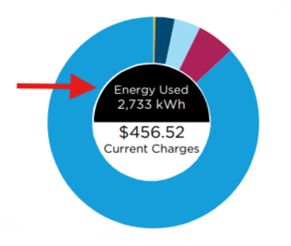Extreme temperatures require your HVAC system to work harder to maintain a comfortable indoor environment, which can significantly increase your energy usage. Because bills are based on energy usage, customers often see bill increases in the hotter and colder months.
We understand that unexpected bill increases can be challenging - and we are here to help. Explore our range of assistance options designed to support you in managing your energy costs effectively and also help you lower your energy usage. We're committed to ensuring you have the information and resources you need to make the best choices for you and your family.
Please contact our Customer Solutions Center at 800-572-1113 or send us a direct message on Facebook to discuss options.
Ways We Can Help
Kentucky Power partners with Kentucky Community Action to help income-eligible households with utility bills, particularly in the winter months when energy usage is highest. The following programs are available for qualifying customers through your local agency:
Apply for the EnergyAdvantage at Home program, which offers supplemental funding for residential energy audits, rebates and high-efficiency installations for customers with electric heat. The program supports qualifying customers by offering direct-install efficiency upgrades during your home assessment to get your home running more efficiently right away.
Enroll in AMP (Average Monthly Payment) Plan. AMP evens out payments throughout the year to account for seasonal spikes in usage. Bills adjust on a 12-month rolling average and change only slightly each month, making bills more predictable. And unlike traditional budget billing plans, there is no settle-up month.
Set up a payment plan. In cases where bill payments have fallen behind, it may make sense to consider setting up a payment arrangement. Customer service representatives can describe specifics based on your unique situation. We offer:
Prevent disconnection of a friend or relative. You can help someone avoid electric service disconnection with our Third-Party Notification program. This free service is often used for accounts of those who are elderly or ill, but it can be used to help any customer.
Factors Contributing to Increased Bills
Increased energy usage. The primary reason your bill has increased is because you used more energy. Check your bill to see how much energy you used by reviewing the usage chart included on your statement.

How you heat your home. During the colder months, energy usage is mostly impacted by the method you use to heat your home. Here is a list of factors with some common heating methods. Click on each to see how different heating methods can impact energy use.
-
-
Even if you rely on your natural gas or propane as your home's main heat source, your electricity bill can still increase. Your gas furnace most likely relies on an electricity-powered blower to help move hot air through your home's ductwork. That electricity-powered blower is operating longer and harder to keep the same temperatures in your home when the outside temperature plummets.
-
-
Extreme cold weather can require your heat pump to change how it operates. When outdoor temperatures fall below 30 degrees, when heating needs are highest, most of the heat provided comes from the less efficient supplemental electric resistance heat to maintain indoor warmth. This is how your bill can increase even if it seems you haven't done anything differently.
Learn more about how heat pumps work and how Auxiliary and Emergency Heat mode impact your usage, in this video from Community Housing Partners, a regional non-profit focusing on affordable housing.
-
-
Even if you rely on your natural gas furnace as your home's main heat source, your electricity bill can still increase. Your natural gas furnace most likely relies on an electricity-powered blower to help move hot air through your home's ductwork. That electricity-powered blower is operating longer and harder to keep the same temperatures in your home when the outside temperature plummets.
-
-
In extreme cold periods, many people supplement their normal heating system with portable electric space heaters. Electricity to run just one 1,500 watt space heater can cost more than $4 a day, or $30 a week and $130 a month.
-
-
These heat sources may also indirectly affect your electricity bill. While there are higher-efficiency stoves now available, they still require electricity-powered venting and blower fans to exhaust fumes and smoke from your house.
* This information is meant to give you an overview of your heating source's operation. Consult your system's manufacturer for specific information.
Longer billing periods. Check the number of days being billed by looking at the "Current Bill Summary" on the first page. Billing periods can vary between 28 and 35 days. Longer billing periods can increase the overall bill amount.
How Do I Know My Bill is Accurate?
Bills include important details, and we want to make sure you Understand Your Bill. Here are a few items to look for to ensure the accuracy of your bill:
- Check whether the bill is estimated or based on an actual reading under "Meter Read Details" at the top of page 2 of the bill. More than 99 percent of customer bills are based on actual usage by using radio frequency meters and collecting meter readings remotely by vehicle. In the next few years, all Kentucky Power customers will receive a smart meter which will allow for much more energy usage control for you, even less estimated bills and better outage detection for us.
- Compare the average daily cost to the previous month or to the same billing period the previous year by looking at "Usage Details."
- Compare the average temperature for the current billing period to the month before and to the same period the previous year by looking at your Usage Details.
More Ways to Control Your Energy Usage
There are many ways you can make a big difference in how much energy you use for heating, cooling, lighting, appliances, electronics and water heating. Check out these energy savings tips to start saving money today.